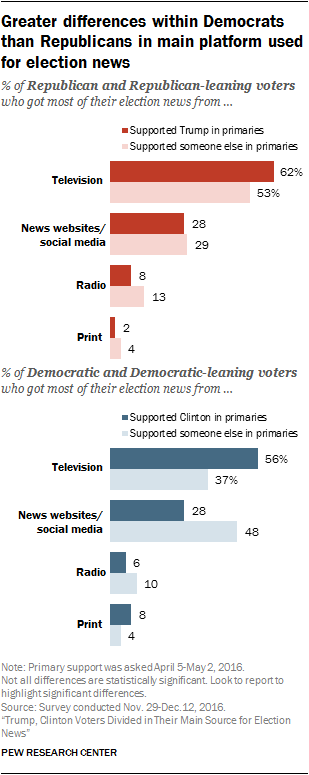There isn’t a lot new in Pew Research’s survey today about where people got their news about the election and campaign. Trump supporters mostly used FoxNews and Clinton supporters didn’t.
But there are a few interesting nuggets, including the fact that digital publishers weren’t much of a source. That includes operations such as Breitbart or BuzzFeed.
So the sun hasn’t set quite yet on traditional news “brands.”
The “main news sources” mentioned by at least 3% of each voting group stand out in another way: they consist entirely of longstanding national news brands – cable and broadcast TV, newspapers, radio – along with local media and Facebook.
The digital news publishers that played prominent roles in the campaign did not appear to serve as main news sources for either Trump or Clinton voters.
This notably includes Breitbart (named by 1% of voters), an early supporter of Trump’s campaign; BuzzFeed, which broke a number of stories over the course of the election (named by no voters in our sample); and The Huffington Post, which added an editor’s note calling Trump a “liar” to any articles about the Republican candidate during the election – though it has since stopped the practice (named by 1% of voters).
The survey can’t be good news, either, for radio. It didn’t appear as much of a factor when it came to a role as a main source of campaign and election news.
TV’s dominance appears to be age-related. TV was listed as the main source for Clinton supporters (53%) but fell to 37% among people who supported someone else in the primaries.
But no digital native-news publisher stood out in the survey, further clouding the question of whether the news torch has yet been passed to a new generation, or even to a new platform — smartphones — as convention wisdom has suggested.
In terms of primary support, a greater divide is again evident among Democrats than Republicans.
Among the six digital-native sources asked about, Republicans only differ in their reliance on Breitbart: 16% of Republican and Republican-leaning voters who supported Trump in the primaries used Breitbart regularly for campaign news, compared with 8% of Republican voters who supported someone else in the primaries.
But for Democratic voters, four of the six sites were more likely to be used by voters who didn’t support Clinton in the primary than those who did: The Huffington Post, BuzzFeed, Google News, and even Breitbart (though only 3% of Democrats who supported another candidate in the primaries regularly got news from this site).

